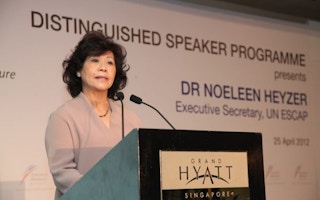Asia needs to break the vicious cycle of energy poverty affecting hundreds of millions of its people and it needs to spend about US$12.3 billion a year for this to happen, a top United Nations official said on Wednesday.
Executive secretary Noeleen Heyzer of the UN Economic and Social Commission for Asia and the Pacific (ESCAP) said at a lecture to energy industry leaders in Singapore that despite Asia’s rapid economic growth, it still remains the region with the highest number of people - at 675 million - without access to modern energy.
Universal access to energy will require an estimated annual investment of US$48 billion, which is about 3 per cent of total energy investment worldwide, she said.
Asia’s share will come to about US$12.3 billion a year, and should be invested in renewable energy technologies and energy efficiency improvements so that the region can move away from fossil fuel-dependent growth, which is subject to supply uncertainties and price volatility, she added.
She also noted that there is massive potential for energy efficiency gains in Asian countries as many are starting from a low base. Asia could double its rate of energy efficiency improvements and uplift the vast majority of its population to middle income status by 2050 at significantly lower energy cost, she said.
She told a 250-strong audience at the event organised by Singapore’s Energy Market Authority that Asian economies can also aim for a higher share of renewable energy than the current 2 per cent in their energy supply mix as they meet the expected rapid rise in energy demand.
Speaking on the upcoming Rio+20 summit, Dr Heyzer - who is Singaporean and the first woman to lead the UN organisation - said that the summit provides the best chance for countries to commit to greening their economies.
“This will require nothing less than a fundamental reset of the global agenda,” she said.
“We’re so good at creating compartments and silos between ministries… none of us are trained to look with a mindset of multiple perspectives. So Rio+20 challenges us to connect the dots… to realise that sustainable development is not just an environment issue, but about building a resilient planet that supports not just us but future generations,” she said.
World leaders are expected to converge in Rio de Janeiro in June for the Rio+20 United Nations Conference on Sustainable Development, which marks the 20th anniversary of the 1992 UN Rio Earth Summit that pushed the environmental movement into the mainstream. They will discuss ways to green the global economy and policies for sustainable development.
Recent reports have downplayed expectations of the summit as it is unclear how many leaders will attend.
EMA chief executive Chee Hong Tat, who opened the lecture titled “Rio+20: Implications for Energy Access and Sustainable Development in Asia”, noted that China, India and Asean will make up more than half the global energy demand growth by 2035.
“Although Asia is blessed with rich fossil fuel resources, concerns on climate change have increased pressure on countries to lower their carbon footprints. It is therefore important for us to address sustainable energy models for future development.”










